We may earn revenue from the products available on this page and participate in affiliate programs. Learn More ›
Wasp traps are a simple yet effective way to reduce wasp activity around a home, especially during peak summer months. While wasps can be beneficial for controlling other pests in the yard, their stings and aggressive behavior make them unwelcome guests near patios, decks, and doorways. To find out which traps actually deliver results, we tested six popular models in real-world backyard conditions.
A good wasp trap can help prevent nests from forming in the first place by luring and capturing wasps before they settle in. Most traps use bait to attract flying pests into a funnel-style container they can’t escape, ultimately leading to their death by drowning or suffocation. Choosing the right design—and the right bait—can make a noticeable difference in effectiveness.
Of all the options we tested, we were most impressed by the Spectracide Wasp, Hornet & Yellowjacket Trap. It stood out for its high catch rate, ease of use, and refillable design, making it a reliable choice for long-term wasp control. Keep reading to discover other top options and to find the best wasp trap for your home.
- BEST OVERALL: Spectracide Wasp, Hornet & Yellowjacket Trap
↓ Jump to Review - BEST BANG FOR THE BUCK: X-Pest Solar-Powered Wasp Trap
↓ Jump to Review - BEST VISUAL LURE: Rescue! VisiLure TrapStik for Wasps
↓ Jump to Review - BEST PASSIVE DEFENSE: Decyool Paper Wasp Nest Decoys
↓ Jump to Review - BEST DISPOSABLE: Stingmon Disposable Wasp Traps
↓ Jump to Review - BEST MULTI-INSECT TRAP: DynaTrap 1/2 Acre Mosquito Trap
↓ Jump to Review
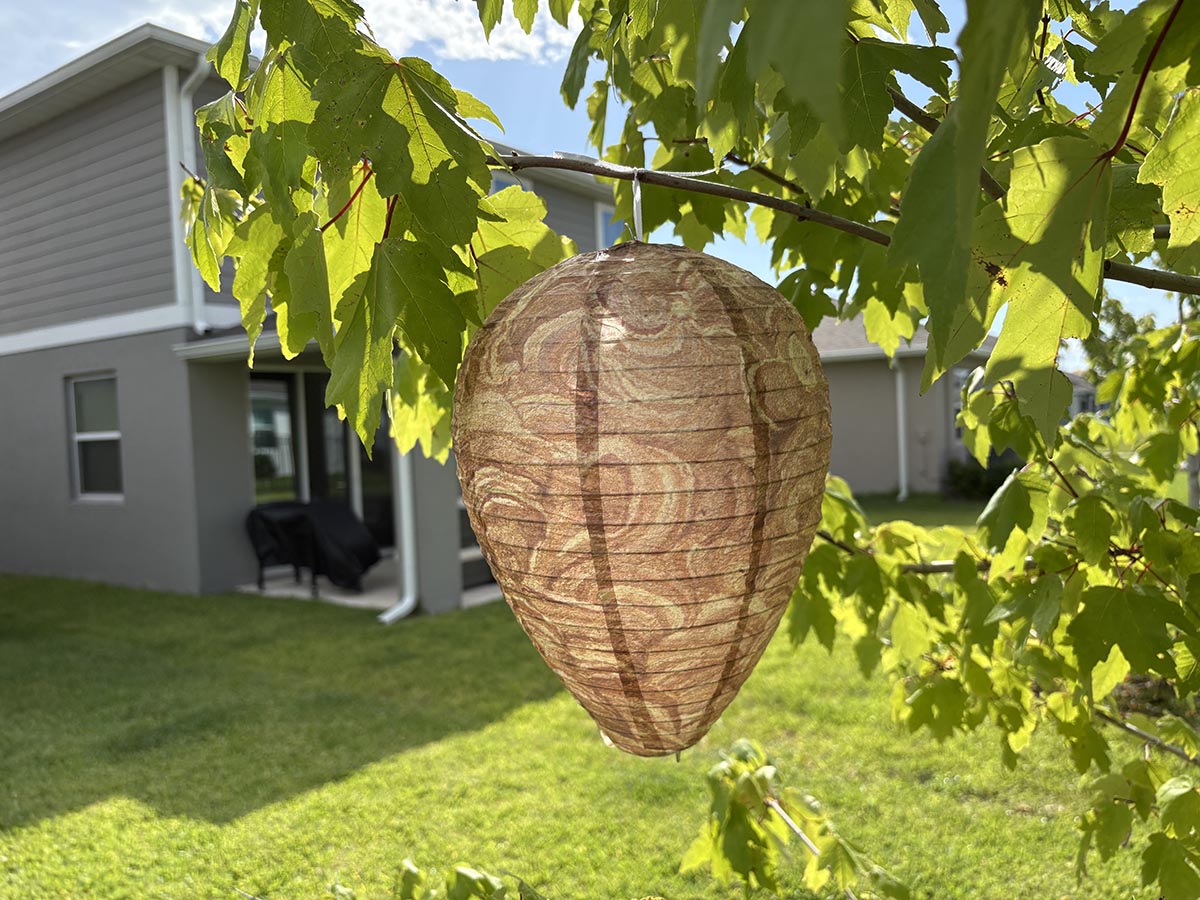
Wasp Traps Comparison
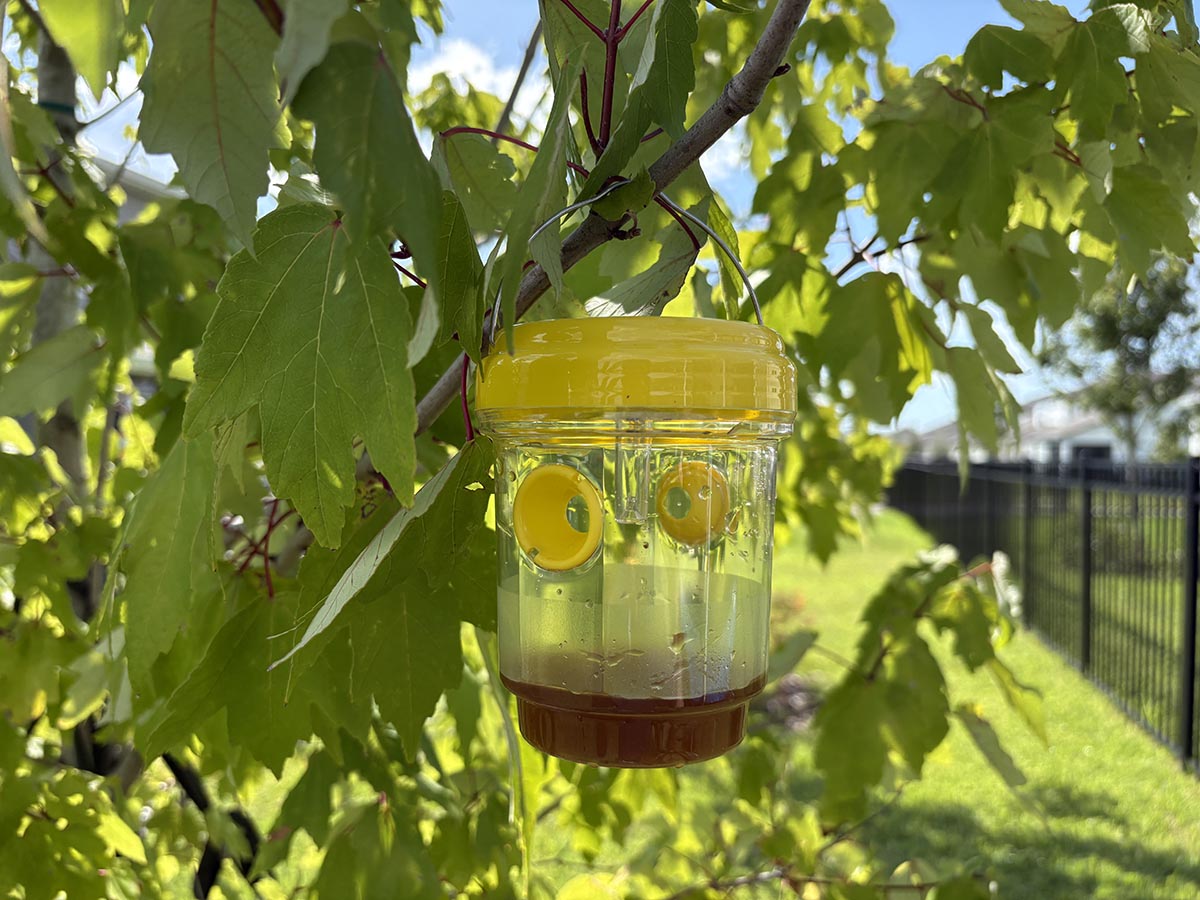
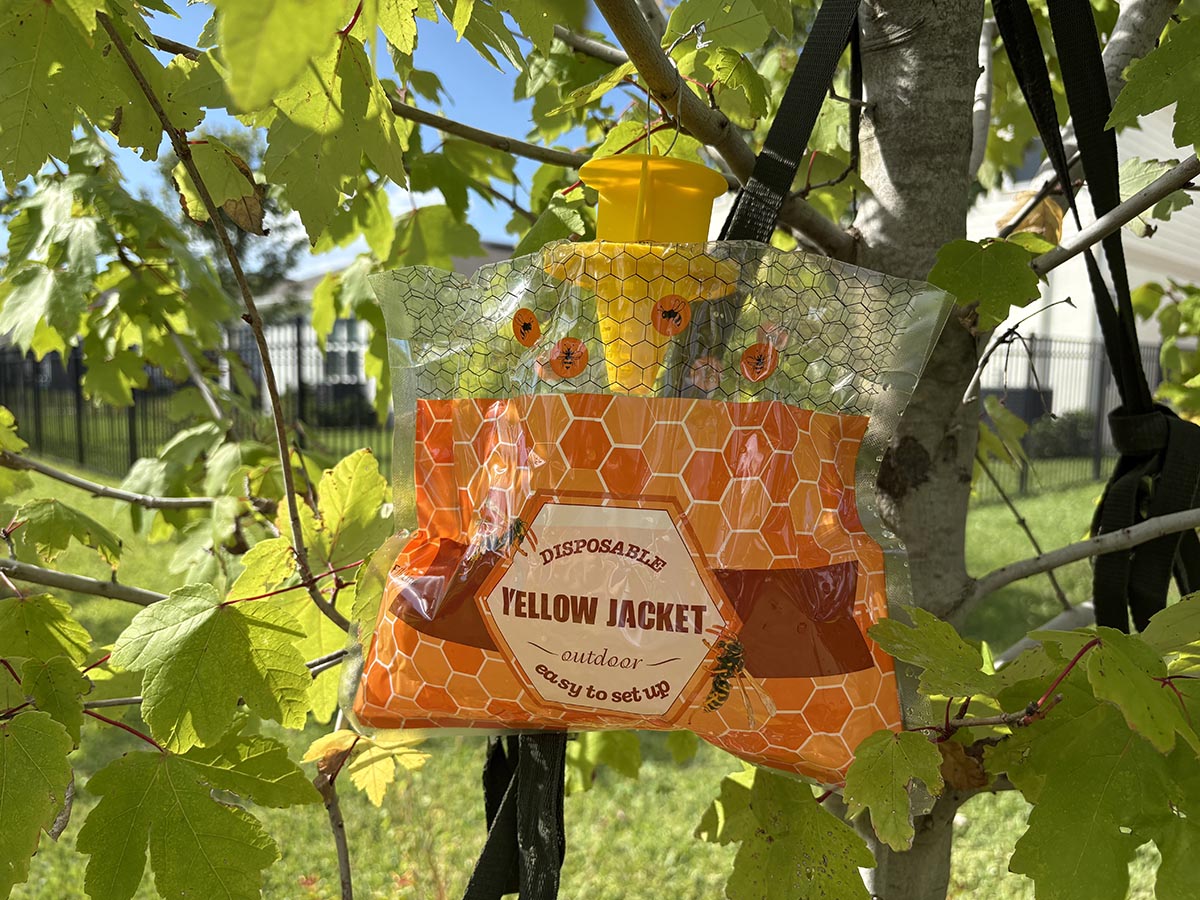
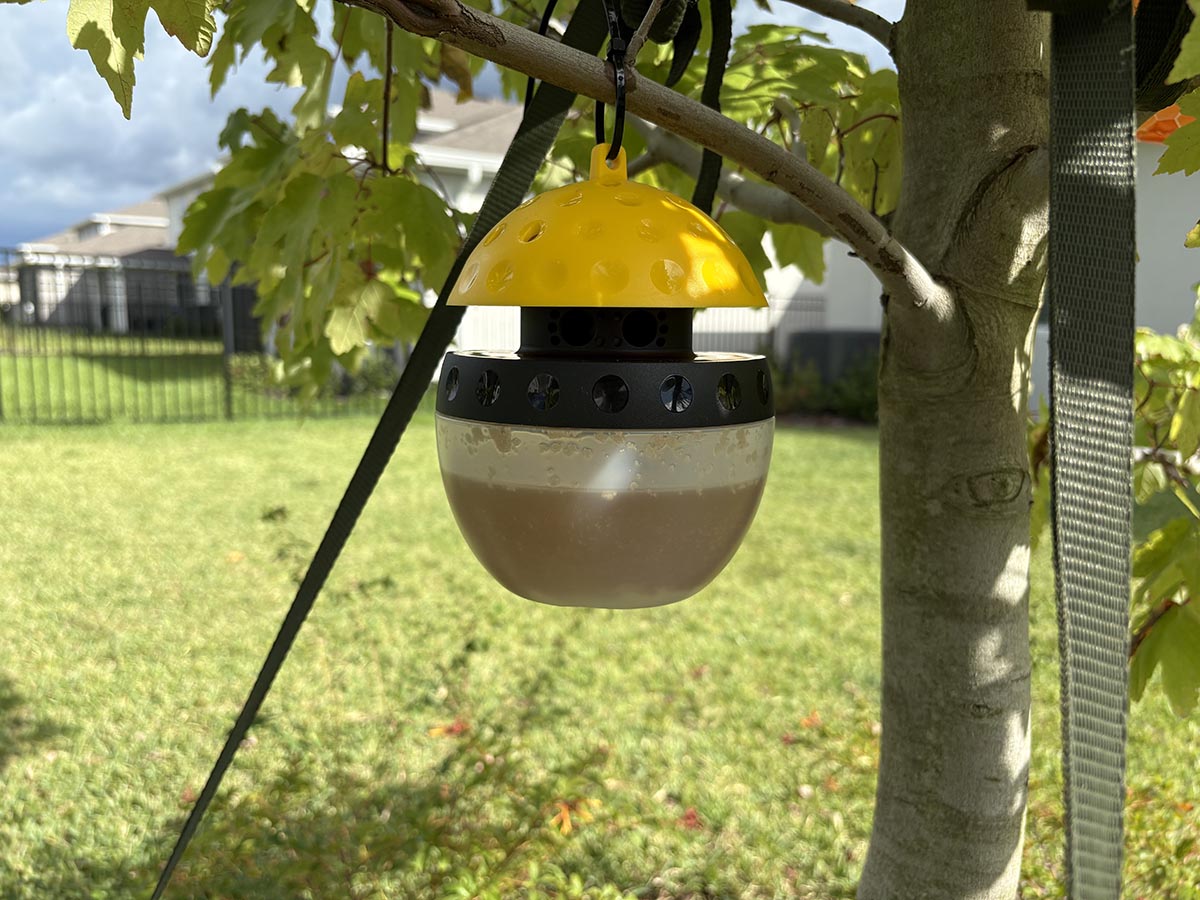
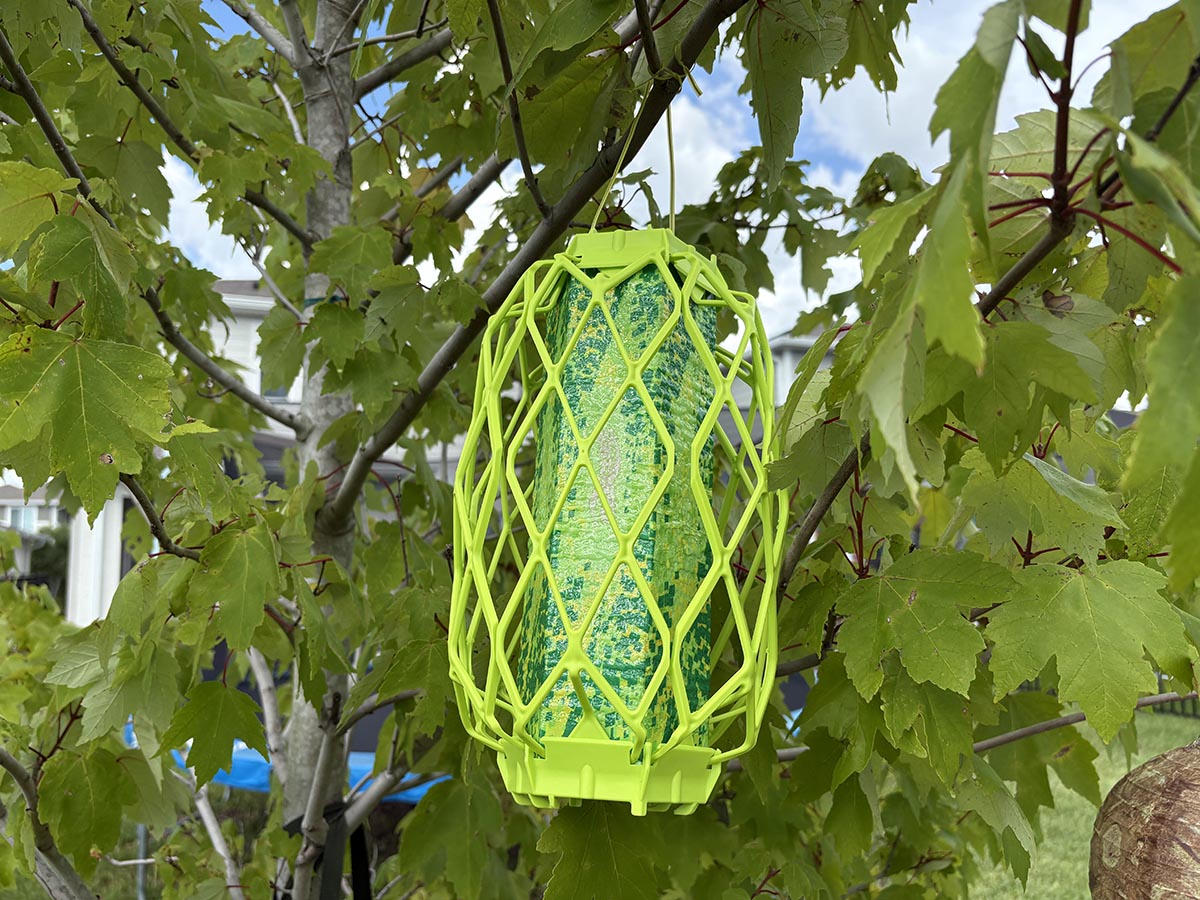
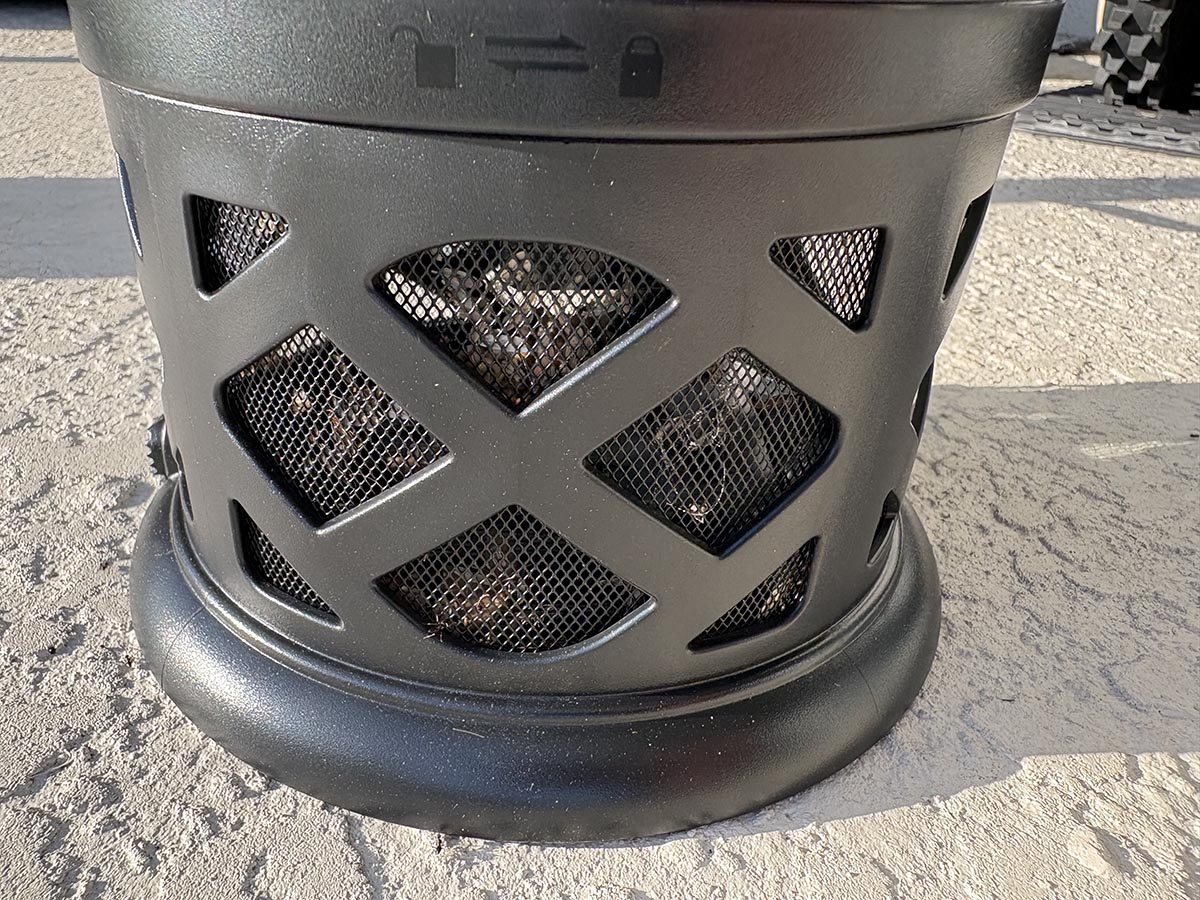
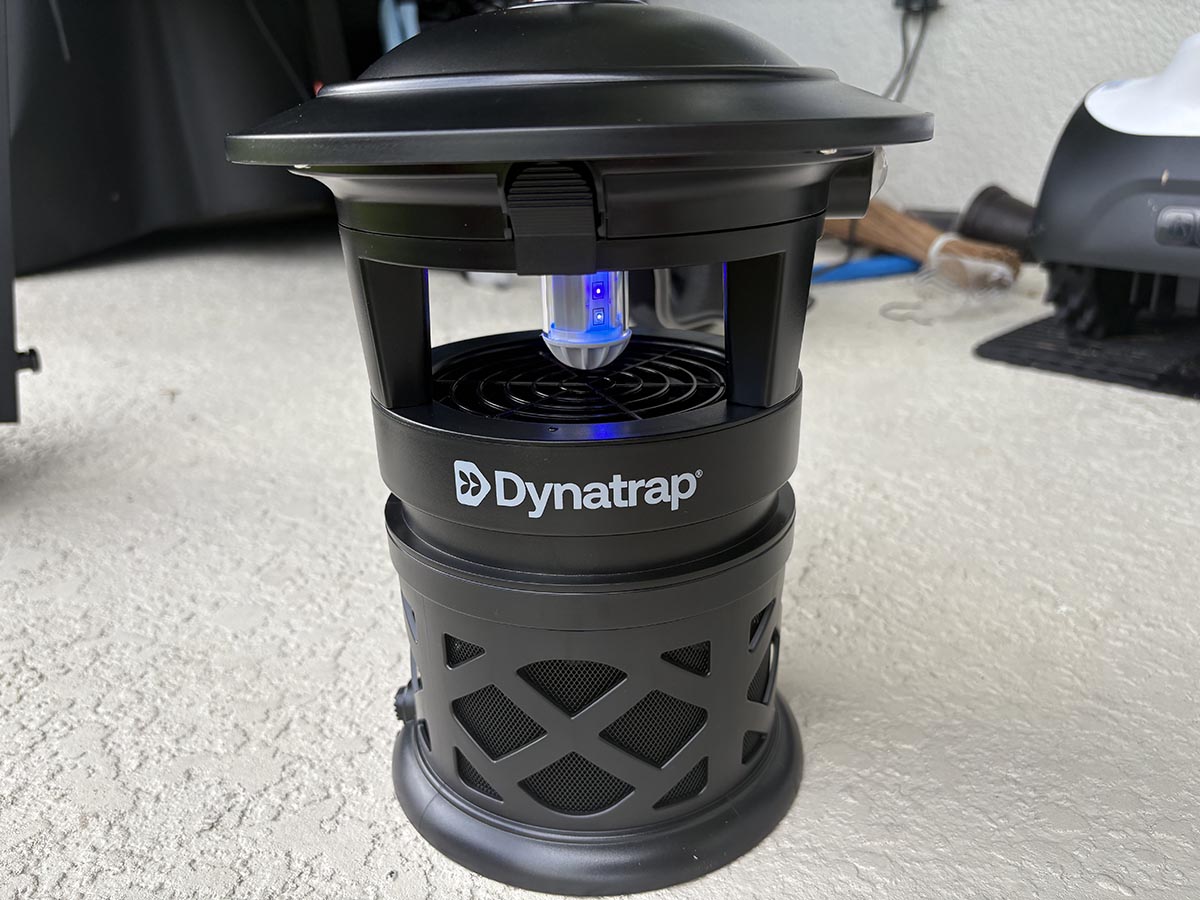
Before You Buy a Wasp Trap
Before buying a wasp trap, there are several factors to consider. Wasp catchers can be beneficial in managing small to moderate wasp populations, particularly in contained areas such as small yards or patios. However, they might not be the most efficient solution for extensive infestations or large, open areas.
While getting rid of wasps using traps can effectively reduce the number of foraging wasps, they don’t necessarily solve the issue if there’s a nest nearby. It’s also important to remember that traps may inadvertently capture nontarget beneficial insects, like bees, depending on the bait used.
If you’re looking for an eco-friendly, more humane method, consider starting with a wasp repellent. Many repellents can deter wasps from setting up a nest in the first place, and they pose less risk to nontarget species.
Our Top Picks
The list below narrows the field to some of the top wasp and hornet traps on the market. These traps are easy to set up and use baits and designs that make them effective; some models even blend in well with landscaping.
Best Overall
Spectracide Wasp, Hornet & Yellowjacket Trap
See It
See It
See It
What We Like
- Includes bait and yeast packet
- Barely noticeable odor
- Catches wasps quickly
- Reusable, sturdy build
What We Don’t Like
- Not ideal for patio placement
Specs
-
Type
Bait trap -
Quantity
1 -
Material
Hard plastic ball
Our Ratings
| Ease of Use | 4.3/5 | Effectiveness | 5/5 | Value | 5/5 |
The Spectracide Wasp, Hornet & Yellowjacket Trap stood out in our testing as the most effective and user-friendly option right out of the box. It comes with everything needed to get started—no mixing sugar water or hunting for bait ingredients. Setup was simple: Just combine the included yeast packet with the liquid bait, hang the trap, and twist open the top. We placed it in a tree at the edge of the yard, and unlike many other traps, this one didn’t emit an offensive odor. In fact, the scent was barely noticeable, which made it much easier to place near garden beds or patios without driving anyone indoors.
Performance-wise, this is a wasp trap that works. Within a day, we found several wasps already caught. The large chamber means the bait lasts a long time, and the trap’s sturdy construction held up well through sun and light rain. It’s also reusable—after the initial bait runs out, refilling it with a homemade mix is just as effective, making this a longer-term solution with less plastic waste than fully disposable traps. For convenience, effectiveness, and value, this trap was the clear winner in our testing.
What our tester says: “The Spectracide ball was definitely the most impressive wasp trap I’ve tried. I loved that everything was included to get started, and the bait didn’t smell terrible.”—Paul Rankin, Product Reviews tester and writer.
Get the Spectracide wasp trap at Amazon, The Home Depot, Ace Hardware, or Walmart.
Best Bang for the Buck
X-Pest Solar-Powered Wasp Trap
See It
What We Like
- Comes in a set of four
- Solar-powered light adds lure
- Easy to refill and clean
- Great value for reusable traps
What We Don’t Like
- No included bait
- Trapped insects are visible
Specs
-
Type
Reusable light lure -
Quantity
4 -
Material
Plastic
Our Ratings
| Ease of Use | 4/5 | Effectiveness | 4.5/5 | Value | 5/5 |
The X-Pest Solar-Powered Wasp Traps offer great value for anyone looking to manage wasps without spending much. This set includes four glass wasp traps, each equipped with a small solar panel that powers an LED light at night—an added lure that helps draw insects in after dark. While these traps don’t include bait, they give several easy DIY options in the instructions. We used sugar water during testing, but beer, wine, or sweet vinegar would all work. Setup is quick, and the three entrance holes on each trap do a solid job of keeping wasps from escaping once they’ve entered.
Though not very large, the traps are big enough to handle light to moderate wasp activity, especially if spread out across different areas of the yard. They’re easy to open, clean, and refill, which helps extend their lifespan. The only real downside is that the clear chamber can make the trapped bugs visible, which may not be ideal in busy areas of the yard. Still, for the price and performance, this reusable set stands out as a smart pick for budget-conscious homeowners.
What our tester says: “For reusability, this 4-pack is unbeatable. Durable materials and a nifty night light helps keep these traps going for multiple seasons.”—Paul Rankin, Product Reviews tester and writer.
Get the X-Pest wasp traps at Amazon.
Best Visual Lure
Rescue! Wasp TrapStik
See It
See It
See It
What We Like
- No bait or mess required
- Effective visual lure
- Extremely easy setup
- Bird guard adds protection
What We Don’t Like
- Bright color is hard to hide
- One-time use only
Specs
-
Type
Disposable sticky trap -
Quantity
2 traps -
Material
Plastic cylinder
Our Ratings
| Ease of Use | 5/5 | Effectiveness | 4/5 | Value | 5/5 |
The Rescue! TrapStik for Wasps takes a clever, chemical-free approach to pest control by using color and stickiness instead of bait. With its VisiLure technology, the trap visually attracts wasps using colors they’re drawn to, then traps them on a large sticky surface where they eventually die. Setup is impressively simple—the outer packaging unfolds into clear instructions, and the trap clicks together in seconds. We had it hung and caught bugs within minutes. By the next day, over a dozen insects were already stuck to the surface.
The TrapStik doesn’t use any messy liquids or bait, which makes it a cleaner option, especially near doors, garages, or sheds. A built-in plastic guard keeps birds and larger creatures from getting stuck. While highly effective, its bright green and yellow design isn’t exactly subtle—so consider hanging it in a more discreet spot if aesthetics are a concern. For ease of use and fast results, this trap makes a great addition to a wasp-fighting lineup.
Get the Rescue! TrapStik wasp trap at Amazon, Ace Hardware (single trap), Tractor Supply Co. (single trap), or Walmart.
Best Passive Defense
Decyool Paper Wasp Nest Decoys
See It
What We Like
- Humane, no-kill deterrent
- Very quick and easy setup
- No mess or chemicals
- Lightweight and reusable
What We Don’t Like
- Effectiveness is hard to verify
- Looks like a real wasp nest
Specs
-
Type
Decoy -
Quantity
6 -
Material
Paper with metal frame
Our Ratings
| Ease of Use | 5/5 | Effectiveness | 4/5 | Value | 4/5 |
The Decyool Paper Wasp Nest Decoys take a hands-off, humane approach to wasp control by using mimicry rather than bait or traps. Wasps are territorial and generally avoid building near existing nests, so these realistic-looking decoys are designed to trick them into staying away. Setup couldn’t be easier—just unfold the paper lantern and insert the included metal frame to create a lightweight faux nest. Hang it from a tree, porch, or eave, and that’s it.
While this method doesn’t trap or kill wasps, it may help deter them from settling nearby. That said, its effectiveness can be hard to measure—there’s no obvious “caught” count to look at. And while it’s clever in concept, having what looks like an actual wasp nest in the yard might not be everyone’s favorite aesthetic choice. Still, for those who want a passive and non-toxic wasp control method, this decoy offers a simple, maintenance-free solution.
Get the Decyool wasp decoy at Amazon.
Best Disposable
Stingmon Disposable Wasp Traps
See It
What We Like
- No cleanup required
- Easy and quick to set up
- Discreet printed exterior
- Custom bait reduces odor
What We Don’t Like
- Not reusable
- Bait not included
Specs
-
Type
Disposable bait trap -
Quantity
6 -
Material
Plastic bags
Our Ratings
| Ease of Use | 4/5 | Effectiveness | 4.5/5 | Value | 3.8/5 |
The Stingmon Disposable Wasp Traps are a no-fuss option for controlling wasps in the yard, especially for those who would rather not deal with reusable containers or messy cleanup. Each trap comes as a sealed plastic bag—just cut a hole in the top, pour in the bait of choice, and hang it up. While bait isn’t included (unlike some competitors), that might actually be a plus: many pre-packaged baits can smell overwhelming, so making some at home can be a more pleasant experience overall.
Once set up, wasps enter the trap through the top and can’t find their way out. Over time, the bag will fill up with wasps, at which point just twist the top shut and toss the entire trap away—no need to interact with the contents. We also liked the printed design around the bag, which helps obscure the view of trapped insects. The only downside is the lack of reusability, which may not appeal to those looking for a more sustainable option.
Get the Stingmon wasp traps at Amazon.
Best Multi-Insect Trap
DynaTrap 1/2 Acre Mosquito Trap
See It
See It
See It
What We Like
- Traps a wide range of flying pests
- No bait or mess required
- Quiet, fan-based design
- Easy to empty and clean
What We Don’t Like
- Not wasp-specific
- Can draw in non-pest insects
Specs
-
Type
Light trap -
Quantity
1 -
Material
Hard plastic
Our Ratings
| Ease of Use | 4.8/5 | Effectiveness | 5/5 | Value | 5/5 |
The DynaTrap 1/2 Acre Insect Trap proved to be a surprisingly effective tool for reducing wasp activity—especially when placed in high-traffic zones around the yard. Setup was effortless: Plug it in, place it near a known wasp hangout, and let it run. Within hours, we found a variety of flying pests—including wasps—trapped inside the bottom collection chamber. Instead of relying on sticky surfaces or bait, the DynaTrap uses a UV light to lure insects and a quiet fan to pull them into a containment area where they eventually dehydrate.
While it isn’t a wasp-specific trap, the device still caught a notable number of them during testing, which makes it a useful addition to a broader pest control strategy. The design is sleek and subtle, making it a good fit for patios, porches, or garden spaces without drawing attention. The collection chamber detaches easily with the push of a button, so there’s no need to handle bugs directly. The only caveat? Because it attracts a wide range of insects, you might find it brings a few unintended guests like moths or crickets to the area before they’re trapped.
Get the DynaTrap wasp trap at Amazon, The Home Depot, Walmart, or DynaTrap.
Or, DIY Your Own Wasp Trap
While there are plenty of great commercially available wasp traps, creating your own DIY version is a cost-effective and eco-friendly alternative to buying one. Using simple materials found around the house, you can quickly assemble a trap that effectively captures wasps.
First, gather the necessary materials:
- Plastic bottle
- Sharp knife or scissors
- A piece of wire or string
- Sweet liquid bait such as sugar water or fruit juice
Start by cutting the plastic bottle about one-third of the way down from the top. Remove the cap and invert the top portion of the bottle, placing it inside the lower portion to create a funnel-like entrance. Secure the two sections together using the wire or string.
Next, poke a few small holes near the top of the bottle to allow the scent of the bait to escape and attract the wasps. Fill the bottom of the trap with the bait, ensuring it reaches just below the funnel entrance.
Try hanging the homemade wasp trap in a location where wasps tend to gather, but make sure to position it away from where people gather to avoid attracting the wasps towards human activity.
How We Tested the Best Wasp Traps
| Testing Stats | |
| Products tested | 6 |
| Time spent testing | 2 weeks |
| Tests performed | 3 to 4 |
| Price range | $15 to $70 |
In reviewing dozens of wasp traps for this guide, we prioritized ease of setup, effectiveness, safety, and overall user experience. We hands-on tested six top-rated models and evaluated how quickly they could be assembled and placed, how well they attracted and retained wasps, and how easy they were to maintain or dispose of.
For disposable traps, we looked for designs that could be tossed without mess or contact with trapped insects. Reusable options were scored on durability, bait accessibility, and how easily they could be emptied and refilled. While aesthetics weren’t the top priority, we gave extra points to traps that blended into outdoor spaces without being an eyesore. We also noted whether baits were included, how strong the odor was, and whether the trap required proprietary refills. Our goal was to find traps that work well, are simple to use, and don’t ruin the vibe of your backyard.
What to Consider When Choosing a Wasp Trap
Read on to learn about the different types of wasp traps and crucial factors to consider when shopping for a wasp trap, such as safety, weather resistance, and eco-friendliness.
Types of Wasp Traps
Wasp traps come in reusable, disposable, and sticky varieties. Reusable traps are tubular with a funnel-shaped entrance that, like the Hotel California, allows wasps to enter, but they can never leave. A lure inside the tube attracts the wasps inside. Once trapped, they eventually die from dehydration. The bottom of these traps comes off so the trap can be cleaned out once it’s full.
Disposable traps function similarly to reusable traps. They use a lure to attract the wasps through a funnel-shaped opening that allows them to enter but prevents them from exiting. Instead of a rigid plastic cylinder, disposable traps use a plastic bag. Once they are full, simply throw the whole trap away. And while there is no risk of coming into contact with vengeful survivors with a disposable trap, they are not eco-friendly, nor are they economical, as you must continually replace them.
Sticky traps consist of a cone-shaped cylinder covered in sticky glue. When the wasp lands on the sticky substance, it becomes hopelessly stuck and eventually dies of dehydration. While sticky traps are an effective way of catching wasps, they’ll also catch and kill other types of insects, including beneficial ones. And, unless the trap has a guard around it, it can even cause problems for birds attracted to the insects stuck to it.
Safety and Eco-Friendliness
Wasp traps do not use harmful chemicals. They use food-based baits to attract the wasps, then allow nature to take its course once the wasps are trapped or stuck by drowning them or depriving them of water and food until they die. Reusable traps are the most eco-conscious, since they employ a reusable container as opposed to disposable plastic bags. Sticky traps are perhaps the least eco-friendly option. Not only do they use a disposable design, but they are also most prone to harming beneficial insects and even smaller birds and mammals.
Bait Type
Most wasp trap bait typically consists of a sugary powder inside the container that you activate by adding water just before setting up the trap. Reusable traps use either wasp baits, which you can purchase separately, or foods commonly found in the kitchen pantry, such as apple cider vinegar, soft drinks, or even jam and jelly. Sticky traps attract wasps by using colors that appeal to them, such as bright orange and yellow.
Weather Resistance and Reusability
Since wasp traps spend weeks outside collecting their victims, they’re designed to endure wet weather. They are made out of water-resistant plastic with entrance holes that are small enough and strategically placed so the trap is not affected by rainfall. Since wasp activity mainly occurs during warmer months, there’s no need for wasp traps to endure winter weather.
In addition to having a weather-resistant design, reusable traps typically have ends that unscrew to easily dump the contents of the trap. Once empty, the trap is ready to go back into service.
Ease of Setup
Most wasp traps can be set up in minutes. Simply hang the trap close to wasp activity. Open the trap door and add bait or water as directed. Once the trap is full, remove it and throw it away if it’s a disposable trap, or clean out the contents and add fresh bait if it’s a reusable trap.
Tips for Using Wasp Traps
While many people set up traps in the summertime once wasps become a threat, by then it is often too late. Wasps have already established nests and have begun reproducing. A wasp trap is no match for a thriving wasp nest. At that point, it’s best to use wasp spray. By midsummer, there’s also an abundance of food for these pests to feed on, making them less likely to enter a trap. Nip the problem in the bud and set up a wasp trap in spring when they haven’t had a chance to establish a nest and begin reproducing.
Trap placement is also key. Since traps work by luring wasps in, don’t put them too close to living areas. Place wasp traps at least 20 feet away from outdoor living spaces. Be strategic about where you hang a wasp trap. Hang the trap in a branch of a fruit tree, which is where wasps often gather to feast on fruit.
- Hang traps in the spring to control the wasp population.
- Don’t place wasp traps close to outdoor living spaces.
- Hang traps where wasps gather, such as near fruit trees.
FAQs
If you’re wondering where to hang your new wasp trap or how to clean it, then read on for answers to these and other important questions about these devices.
Wasp traps are effective at attracting and trapping wasps; however, it’s crucial to place them properly. Wasp traps that are placed too close to living areas will actually attract more wasps to the area, increasing the likelihood of stings.
Hang wasp traps at least 20 feet away from living spaces to ensure wasp activity does not increase near people. If possible, hang them in the boughs of nearby fruit trees, where wasps search for food.
When making a homemade wasp trap, it’s important to use bait that effectively lures wasps but doesn’t attract beneficial insects, such as carpenter bees. Wasps are drawn to a variety of foods, but they particularly favor high-sugar substances. That makes sugary soft drinks, fruit juices, and sugar water the best baits for a wasp trap.
First, make sure that there are no live wasps inside the trap to prevent potential stings. Next, remove the trap and carry it to an outdoor trash can. Remove the trap’s lid, then dump the dead wasps into the trash can. Use a hose to rinse out the trap, then reapply bait.
Depending on the type of bait you use, bees can end up caught in the trap. Bees and wasps share similar dietary habits, and are both attracted to sweet substances.
However, there are methods to minimize the risk of trapping bees. One strategy is to use a specific type of bait, such as heptyl butyrate, a chemical that wasps find enticing but bees tend to ignore.
This will depend on how big of a wasp problem you’re dealing with, plus the type of trap you’re using. If using bait, make sure there’s always enough to attract the wasps, and fill it back up when it empties. Once your trap is full, empty it out (if it’s reusable) or toss it away if it’s disposable.
Yes, wasp traps are designed to attract wasps—but only to the trap itself, helping reduce their presence elsewhere in the yard. Proper placement keeps them away from people. If you notice wasps around your yard before you place the trap, the trap will at least help you eliminate them while it attracts (and traps) the rest.
Meet the Tester
Paul Rankin has tested dozens of pest control products in real-world backyard conditions, from mosquito zappers to wasp traps. With a background in product reviews and hands-on DIY experience, he takes a straightforward, results-driven approach to help readers find solutions that are effective, easy to use, and worth the investment.
Additional research provided by Tony Carrick.


